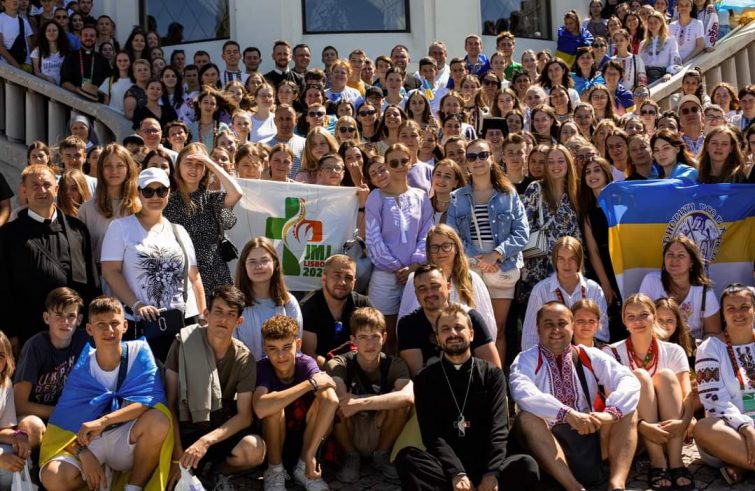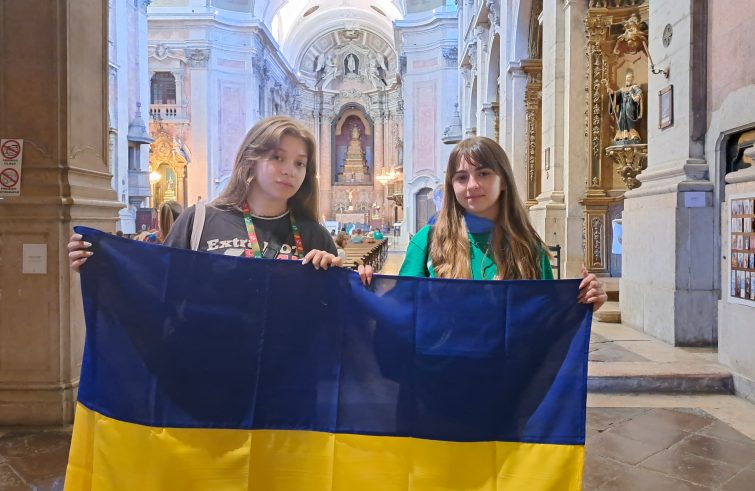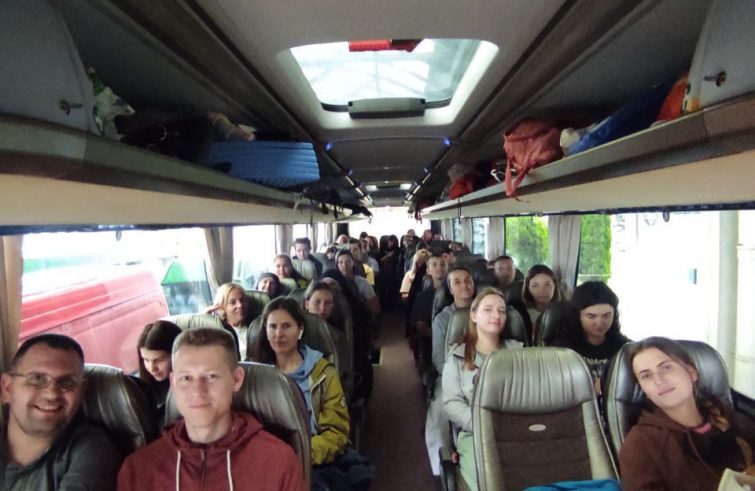
(from Lisbon) Their accounts are like a river in flood. University classes are constantly interrupted by the sound of air raid sirens. A bomb hit a bus full of people, “right behind me”, they remember. More friends, acquaintances, family members, injured or killed by artillery fire. The Ukrainian youths carry the scars of their Stations of the Cross on their flesh. Their eyes are filled with tears that do not flow, but are ever present. Viktoria comes from Lviv, she is 19 years old. Being here in Lisbon feels strange to her. “Every time I see a plane flying across the sky,” she says, “I get scared. I’m afraid it might be a rocket. Then I stop, I tell myself I am safe, and I calm down”. That’s what war is like, it gets into you. Standing next to her is 19-year-old Olena. “It’s terrifying, hard to talk about. When you wake up in the morning, you don’t know what is going to happen to you that day, or where you are going to be a few minutes later. War destroys everything, even our life plans, our dreams. We have seen many people killed. I dream that all those who had to flee their towns will one day be able to return to their homes. Olena and Viktoria are also here to talk about what is happening in their country. They want the reality to be known. But, they admit, it is hard for them to imagine a reconciled future. The hearts are still broken, and a step towards forgiveness – at least for now – is a leap into a very deep abyss. “We can’t forgive,” they confess, “because we don’t see that they feel guilty for what they have done to our country. We are afraid that if we forgive them, they will come back. Forgiveness? Not now, maybe in a few years. We need time.”
 “Donetsk, Odessa, Lutsk, Kharkiv, Kiev. Most of these young people experienced the war first hand. They have all come from areas that had been occupied by the Russians for varying lengths of time and from cities that had been heavily shelled. They are the first eyewitnesses of what our country is facing today.” Maksim Ryabukha, auxiliary bishop of the Greek Catholic Exarchate of Donetsk, describes the long bus journey that brought him to Lisbon with a group of young people. “I am impressed by their overwhelming love of life,” says the bishop. “They are not crushed by the reality of the war. They have some clear certainties in their hearts, the first of which is that they are called to live. They want to live their youth to the full, to meet new friends, to grow, to laugh, to dream, to see the world, to learn. The Lisbon experience is first and foremost an experience for young people by young people.”
“Donetsk, Odessa, Lutsk, Kharkiv, Kiev. Most of these young people experienced the war first hand. They have all come from areas that had been occupied by the Russians for varying lengths of time and from cities that had been heavily shelled. They are the first eyewitnesses of what our country is facing today.” Maksim Ryabukha, auxiliary bishop of the Greek Catholic Exarchate of Donetsk, describes the long bus journey that brought him to Lisbon with a group of young people. “I am impressed by their overwhelming love of life,” says the bishop. “They are not crushed by the reality of the war. They have some clear certainties in their hearts, the first of which is that they are called to live. They want to live their youth to the full, to meet new friends, to grow, to laugh, to dream, to see the world, to learn. The Lisbon experience is first and foremost an experience for young people by young people.”
 Here in Lisbon, today is also the day when young people from all over the world make the Stations of the Cross to remember the suffering and challenges that young people face in different contexts. Bishop Ryabukha gives voice to his “martyred” Ukraine. “These young people are carrying a heavy burden,” he says.
Here in Lisbon, today is also the day when young people from all over the world make the Stations of the Cross to remember the suffering and challenges that young people face in different contexts. Bishop Ryabukha gives voice to his “martyred” Ukraine. “These young people are carrying a heavy burden,” he says.
“The cry of Ukraine is very strong. We are also here to give a voice to this cry, to testify to the world what is happening in our country, the tragic suffering and all the injustice of a war that we never wanted.”
“The various steps towards peace include telling the world what is happening, because evil is at work when there is silence, while every time a voice is raised, every time the world becomes aware of reality, humanity moves forward on the difficult path to peace.” The Bishop referred to the danger, especially for young people, of shutting themselves off in the virtual world and losing direct contact with reality. But “encounters are the stimulus for choices and the catalyst for change.”
“The last word will surely be peace,” Msgr. Ryabukha concluded.
“None of us doubts that we will disappear from the map of the world, although we are aware that this is what Russia wants.” He added: “The Pope has left young people with the certainty that he welcomes them and listens to them. The young people who met him here in Lisbon told us that he was moved. But this meeting was also important for the Pope because, through these young people and their stories, he was able to touch again directly all the suffering and the burden of our people, and that is very important for us.”









